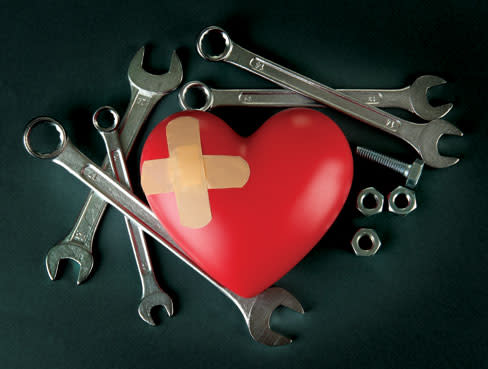Sarasota Health News: March 2014

Broken Heart Syndrome
Losing a loved one can actually injure your heart.
Yes, it's real. In fact, "broken heart syndrome," or stress-induced cardiomyopathy, is a straightforward diagnosis that, after the right tests, is distinct from any other condition.
"Historically, people have witnessed it especially in women," says Bradenton cardiologist Srinivas Iyengar. "The classic example is the mother or grandmother at a funeral grabs her chest, and people say she died of a broken heart."
The symptoms almost always suggest a heart attack. During a period of intense stress, the heart becomes overwhelmed, and the patient experiences chest pain. Doctors first perform an EKG, and the results are indistinguishable from a heart attack. But during cardiac catheterization, when one would expect a heart attack victim to have a blockage, no blockages are found. Then a ventriculogram reveals an oddity: "The bottom part of the heart is blown up like a balloon, and only the top part is moving," says Iyengar.
In fact, that weird appearance of the heart is what gave the condition its other common name, "takotsubo," Japanese for "octopus trap." Japanese doctors, who were among the first to recognize this syndrome on a regular basis, noted that the heart looked like the oblong ceramic vases used for catching octopi.
As Iyengar summarizes the clear-cut diagnosis, "The patient will have chest pain, symptoms of heart failure in the EKG findings, have a normal coronary anatomy and the classic appearance of the octopus trap." The good news is that it's transient—once the stress lessens, there probably won't be any lasting damage. But Iyengar is quick to emphasize that it's important to get medical support during the attack, and patients may need to be monitored for as long as 72 hours afterward.
The condition is most frequent in post-menopausal women, though Iyengar has seen it in all ages and genders. And while it's not exceptionally common, in the last two decades it has become a widely known and acknowledged phenomenon in the medical community.
Searching for a Superbug Vaccine
Overuse of antibiotics has created some scary superbugs. MRSA is a famous one. Clostridium difficile, or "C. diff," is another. But Sarasota's Dr. Michael Swor is now leading the local stage of a national Phase III clinical trial, fast-tracked by the FDA, to test a vaccine for preventing C. diff from affecting patients.
"This is the most worrisome hospital-acquired infection," says Swor. "It's been around for a while, but it's gotten worse and more common even in the last couple years." That threat has created an urgent need for a solution.
"C. diff actually resides in many people's intestinal track as a spore—inactive," says Swor. "When it becomes activated, it generates a toxin, and that's what makes you sick." C. diff causes intestinal distress that is killing 14,000 patients a year, especially older adults and people who have had antibiotic treatment or spent time spent in hospitals or nursing homes. "The vaccine prevents the toxin from being activated," Swor says.
Some 200 sites around the country are participating in the trial; the local trial is based out of Physician Care Clinical Research on South Tamiami Trail and is still recruiting volunteers to participate. Swor encourages interested parties to visit the study's website, cdiffense.org. "[FDA approval] depends how quickly we can get people into the study and collect the required data," he says. "It's important. This could save lives."
C.diff in Brief
Full name: Clostridium difficile
Causes: Most frequently, certain antibiotics destroy normal, helpful bacteria in the intestines, allowing the C. diff bacteria to grow out of control.
Risk factors: Long stays in hospitals or other health care facilities; long-term and/or broad-spectrum antibiotics regimens. Those over the age of 65 are also at higher risk.
Symptoms: Nausea and diarrhea, fever, abdominal cramping leading to loss of appetite, dehydration and kidney failure. Bowel perforation may also occur.
Treatments: Up to this point, the standard treatment has been certain antibiotics that can keep C. diff under control. Physician Care Clinical Research in Sarasota is among 200 sites participating in a current national study of a vaccine for C. diff.
How Safe are Genetically Modified Foods?
Genetically Modified Organisms, or GMOs, have been under fire from consumer groups for creating potentially harmful foods. But science is not necessarily in agreement regarding their dangers. There are a lot of factors to be considered, so education is key.
• Genetically modified foods are regulated by the FDA, USDA and the EPA.
• The National Research Council deems mutagenesis, which has been used more frequently during the backlash against GMOs, to have more potential for unexpected (and possibly harmful) changes in foods that are produced through that process.
• GMOs have allowed farmers to use fewer insecticides on their crops;
however, there's also been a marked increase in herbicides, which may or may not have health implications, but certainly can negatively affect the environment.
Brain Awareness Week: March 10-16
Four tips for a healthy memory:
Diet: Fruits, vegetables, whole grains, plus lean proteins.
Physical exercise: Increased blood flow from physical activity may help brain function.
Mental exercise: Keep trying new mental tasks—from puzzles to music to trying new routes to your usual destinations.
Socialization: In addition to being good mental exercise, interacting with people can ward off memory-killing conditions like stress and depression.
Find more tips and "staying sharp" puzzles at dana.org/BAW.
March 16: First Watch Sarasota Half Marathon and Relay
By the Numbers: Half Marathon
Distance: 13.1 miles
Approximate number of steps: 27,500
Approximate calories burned: 1,700
Last year's winning times:
Male: 1:10:24 Female: 1:19:34
For more health news, click here to read Hannah Wallace's "Health & Fitness" blog. >>
This article appears in the March 2014 issue of Sarasota Magazine. Like what you read? Click here to subscribe. >>



